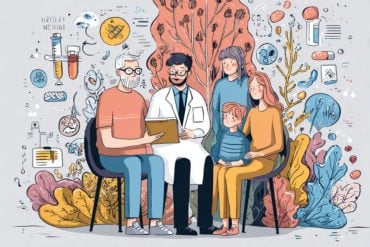Summary: A recent study found that individuals who display traits or behaviors that differ from traditional gender stereotypes are at a higher risk of mental health issues, including anxiety, depression, and low self-esteem. The research, which analyzed data from up to 142,000 participants, revealed that gender nonconformity is more strongly linked to mental health difficulties in men and adolescents.
The study suggests societal intolerance of gender nonconforming behaviors may lead to victimization, contributing to these mental health challenges. Greater understanding and tolerance of gender nonconformity could improve the psychological wellbeing of affected individuals.
Key Facts:
- Gender nonconformity is linked to higher anxiety, depression, and low self-esteem.
- Men and adolescents face a stronger connection between nonconformity and mental health issues.
- Societal intolerance and victimization may drive these mental health risks.
Source: King’s College London
New research from the Institute of Psychiatry, Psychology & Neuroscience (IoPPN) at King’s College London, in partnership with Sichuan University, Chengdu, has found that people that show traits and behaviours that differ from gender stereotypes may be at greater risk of a range of common mental health difficulties, including anxiety, depression and low self-esteem.
The researchers analysed 1975 published reports exploring the relationship between gender nonconformity and poor mental health, with a total sample size of between 25,000 and 142,000 participants depending on the mental health problem studied.
The research, published in Clinical Psychology Review, found that higher levels of gender nonconformity (i.e., when a person’s interests, behaviours, appearance or personality traits don’t conform to gender stereotypes and societal norms) were linked with higher levels of generalised anxiety symptoms, depressive symptoms, lower self-esteem, and increased risk of self-harm and suicide attempts.
The links to generalised anxiety symptoms, depressive symptoms and self-esteem were stronger in men than in women, and the link to depressive symptoms was stronger in adolescence than in childhood.
The authors explain the link with mental health difficulties could be due to a lack of tolerance of gender nonconforming behaviours or traits among societies, resulting in victimisation.
“Reported gender nonconformity, particular that focusing on behaviours rather than dispositions, was consistently associated with poorer mental health but depended on the type of mental health problem studied as well as factors such as sex and age.
“Our results suggest that more understanding and tolerance of behaviours that differ from gender stereotypes could be beneficial to the mental health of individuals who display greater gender nonconformity.
“Further research on possible interventions to improve overall psychological wellbeing in people who display greater gender nonconformity is also needed,” said Dr Yin Xu, senior research fellow at Sichuan University and the study’s first author.
Perceptions of gender nonconformity – which is separate from “gender identity” – is dependent on societal norms, so may vary between countries and cultures.
The researchers also found that behaviour-based nonconformity (which is more socially visible) was more strongly linked to depressive symptoms and self-esteem compared to personality trait-based non-conformity. There was no influence of sexual orientation on these patterns.
“There was no influence of sexual orientation on the pattern we found, which is unusual since gender nonconformity and being non-heterosexual are strongly linked over the life-course.
“It appears that gender nonconformity is associated with poorer mental health irrespective of one’s sexuality.
“The fact that the link was stronger in adolescence is consistent with the growing picture from our programme of research showing that vulnerabilities early in life among gender nonconforming and LGBTQ+ people are linked to their preponderance of poorer mental health,” saidDr Qazi Rahman, Co-Director of the LGBTQ+ Mental Health Research Group at King’s IoPPN and the study’s senior author.
Dr Rahman continued, “Being the target of victimisation due to one’s own gender nonconforming behaviours is likely a precipitating factor. However, other factors early in life might also be important.”
About this mental health and gender conformity research news
Author: Patrick O’Brien
Source: King’s College London
Contact: Patrick O’Brien – King’s College London
Image: The image is credited to Neuroscience News
Original Research: Closed access.
“Gender nonconformity and common mental health problems: A meta-analysis” by Qazi Rahman et al. Clinical Psychology Review
Abstract
Gender nonconformity and common mental health problems: A meta-analysis
We tested the association between gender nonconformity and common mental health outcomes, including generalized anxiety symptoms, depressive symptoms, self-esteem, self-harm attempts, and suicide attempts using an exhaustive meta-analysis.
PsycInfo, ProQuest Central, EBSCOhost, and PubMed were searched for eligible articles using either cross-sectional or longitudinal designs on 11th July 2024.
A total number of 1975 articles were identified and selected following PRISMA. Twenty-five, 48, 32, seven, and nine studies were included on generalized anxiety symptoms, depressive symptoms, self-esteem, self-harm attempts, and suicide attempts, reaching a total sample size of 142,069, 188,681, 27,488, 47,523, and 25,573, respectively.
Meta-analyses were performed using a random-effects model stratified by mental health outcomes.
We found that higher levels of gender nonconformity were associated with higher levels of generalized anxiety (r = 0.06) and depressive symptoms (r = 0.11), lower levels of self-esteem (r = 0.18), and increased risk of self-harm (r = 0.17) and suicide attempts (r = 0.14).
Gender nonconformity had stronger links to generalized anxiety symptoms, depressive symptoms, and self-esteem in men than in women. Behaviors-based gender nonconformity showed stronger links to depressive symptoms and self-esteem compared to traits-based gender nonconformity.
The effect size for the association between gender nonconformity and depressive symptoms was significantly larger in adolescent samples than in childhood samples. There was no significant moderation by sexual orientation.
While gender nonconformity is robustly associated with a range of common mental health problems, the magnitude of this association varies depending on the specific mental health outcomes considered and sex.
Interventions to mitigate mental health differences and improve overall well-being among individuals who display greater gender nonconformity are needed.








